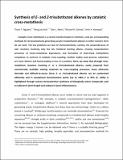Synthesis of E- and Z-trisubstituted alkenes by catalytic cross-metathesis
Author(s)
Nguyen, Thach T.; Koh, Ming Joo; Mann, Tyler J.; Hoveyda, Amir H.; Schrock, Richard Royce
DownloadNguyen et al. Text TSCM FINAL.pdf (591.0Kb)
PUBLISHER_POLICY
Publisher Policy
Article is made available in accordance with the publisher's policy and may be subject to US copyright law. Please refer to the publisher's site for terms of use.
Terms of use
Metadata
Show full item recordAbstract
Catalytic cross-metathesis is a central transformation in chemistry, yet corresponding methods for the stereoselective generation of acyclic trisubstituted alkenes in either the E or the Z isomeric forms are not known. The key problems are a lack of chemoselectivity—namely, the preponderance of side reactions involving only the less hindered starting alkene, resulting in homo-metathesis by-products—and the formation of short-lived methylidene complexes. By contrast, in catalytic cross-coupling, substrates are more distinct and homocoupling is less of a problem. Here we show that through cross-metathesis reactions involving E- or Z-trisubstituted alkenes, which are easily prepared from commercially available starting materials by cross-coupling reactions, many desirable and otherwise difficult-to-access linear E- or Z-trisubstituted alkenes can be synthesized efficiently and in exceptional stereoisomeric purity (up to 98 per cent E or 95 per cent Z). The utility of the strategy is demonstrated by the concise stereoselective syntheses of biologically active compounds, such as the antifungal indiacen B and the anti-inflammatory coibacin D.
Date issued
2017-12Department
Massachusetts Institute of Technology. Department of ChemistryJournal
Nature
Publisher
Nature Publishing Group
Citation
Nguyen, Thach T. et al. “Synthesis of E- and Z-Trisubstituted Alkenes by Catalytic Cross-Metathesis.” Nature 552, 7685 (December 2017): 347–354
Version: Author's final manuscript
ISSN
0028-0836
1476-4687